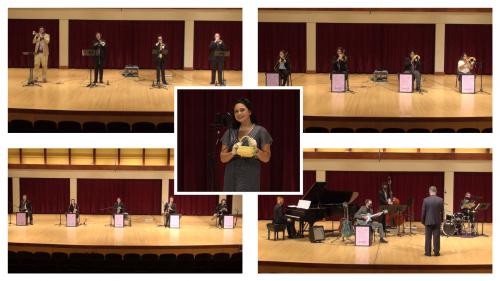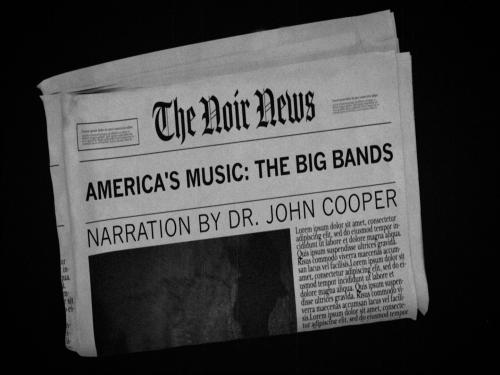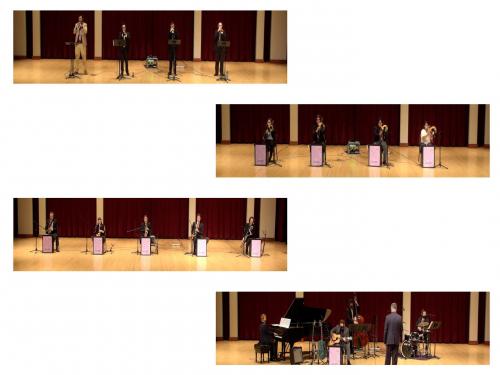University News
YPAS Programming at WIU Adapts to COVID With Virtual Programming
November 18, 2020
Video by Phil Weiss, University Television
MACOMB, IL – A chance for local school children to learn more about music of the Big Band-era will premiere in the coming weeks as part of Western Illinois University's Youth Performing Arts Series (YPAS), despite the limitations imposed by the COVID-19 pandemic.
A 25-minute video, featuring WIU's Jazz Studio Orchestra (JSO) and singers from WIU's jazz studies program, performing live songs from the 1930s and 40s, will be played in the music programs of local schools. The video is narrated by radio disc jockey Eddie Dupree, also known as WIU Professor of Music John Cooper, and was created by Phil Weiss, of University Television.
Cooper said the project was born from a discussion he had with Weiss several years ago, just as the College of Fine Arts and Communication (COFAC) Recital Hall was being fitted for video streaming.
"We were brainstorming about the kind of multimedia projects we would now be able to do with video and music," said Cooper. "We originally thought it would make a nice program to feature the WIU Jazz Studio Orchestra playing live music from the 30s and 40s with video from that era; sort of a war-era tribute to the Greatest Generation. We got together before school started this year and began to strategize about the possibility of this project in a pre-recorded manner due to the COVID-19 restrictions."
At the start of the Fall 2020 semester, Cooper said he was asked to put together a program for YPAS that used the JSO, and this project jumped to mind. After learning that the band could not meet as a complete ensemble because of the pandemic, the project evolved to rotate in the saxophones, trumpets and trombones with the rhythm section. Recording of the project began in mid-September.
Cooper said some new equipment had to be purchased to layer the recording sessions on top of each other to create a harmonious video.
"The rhythm section would record first, then we would bring in each section of horns separately and record their parts, adding them to the rhythm section," he said. "When that was all finished, we added soloists and singers to complete the performance. The band has never played together as an ensemble as would be normal because of the COVID-19 restrictions. You can see the students wearing masks and arranged in a socially distanced manner in the video. The physical distance between musicians is another challenge that hinders players to hear each other closely. We overcame this by feeding each player's sound back through the headphones while they were recording and allowing each student to mix how much of each other they hear with the previously recorded music."
Weiss said the pandemic created a challenge to include visual images with the Big Band music to enhance the experience for the young children who benefit from YPAS.
"This was done with lots of layers," he said. "We added in the scratches and pops you would typically hear on a record and, in the recording the band plays in color, which is a nice contrast to the old video clips."
Weiss said the video is cut into segments so Cooper can go in and discuss each section with the YPAS participants.
"This is just a really neat project," said Weiss. "It has entertainment value, but it's also educational; plus, it showcases WIU musicians and the hard work they are doing."
When the recordings were mostly complete, Cooper and Weiss met to discuss how to construct the presentation. This resulted in a "time-travel kind of idea," Cooper said, "which takes YPAS students on a journey back to 1930s America through the radio to listen to the music."
"Phil suggested writing a script, which I did, and that formed the foundation for the structure of the program," said Cooper. "He and I discussed some conceptual organization, and he set about laying out the flow of the story through video elements arranged to tell the story in a seamless presentation. His formidable artistic talents are evident in the layout and design of the show."
Cooper said WIU students involved in the project rose to the occasion and did something they were not trained to do.
"They had to prepare their parts by envisioning the other musicians around them and performing as if they were all playing together, a skill that even the most seasoned professionals find difficult," said Cooper. "Their resilience, fortitude, and commitment to excellence enabled this to happen. They are a band of musicians that have never played together. It really is quite remarkable, and unlike anything their training has prepared them to do."
Cooper added that the video is a testament to WIU 's fine music students, caring faculty and staff, who help students grow, and administrators who understand that the investment in new technologies can "enable remarkable things to happen."
"Their vision for the benefits that this technology has brought to the School of Music and University, have enabled outreach far beyond the 450 seats of the COFAC Recital Hall and catapulted our University into the 21st century, enabling high-quality outreach far beyond our local community and region," he said. "As a result, our students are receiving an education and skills that prepare them for their future (which, as we have seen, can be quite uncertain) and enable them to understand that though there may be restrictions placed on them beyond their control, they can find a way to still engage in the creation of artistic presentations and personal growth. I am deeply proud of them, and all of the University academic structure that has worked synergistically to create this opportunity. We hope all those who see the program enjoy it as much as we did creating it."
COFAC Director of Development Liz Swigart said moving to the virtual format has allowed the programming to be opened to more children than ever before.
"I don't believe that virtual events and performances are just temporary things," she said. "When we are able to hold in-person performances and events again, it will be accompanied by a virtual delivery as well. In the past, the Performing Arts Society needed to limit the number of schools and the distance from which the schools traveled in order to keep the performances free of charge. Now that these performances are virtual, we are actually able to expand our footprint. We are hopeful that schools beyond our past outreach will now be able to experience the fine arts at Western Illinois University."
Swigart added that over the last decade, YPAS has provided educational programming for hundreds of thousands of children in the surrounding area. For more information on YPAS, visit wiu.edu/YPAS.
Posted By: Jodi Pospeschil (JK-Pospeschil@wiu.edu)
Office of University Communications & Marketing




Connect with us: